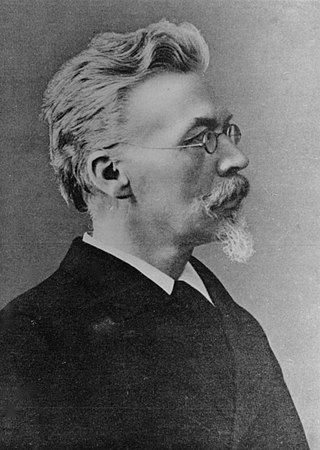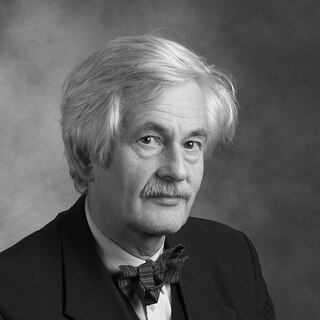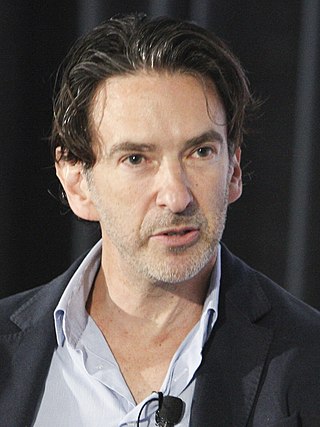Related Research Articles

Psychology is the scientific study of mind and behavior. Psychology includes the study of conscious and unconscious phenomena, including feelings and thoughts. It is an academic discipline of immense scope, crossing the boundaries between the natural and social sciences. Psychologists seek an understanding of the emergent properties of brains, linking the discipline to neuroscience. As social scientists, psychologists aim to understand the behavior of individuals and groups. Ψ (psi), the first letter of the Greek word psyche from which the term psychology is derived, is commonly associated with the science.

Gerardus Heymans was a Dutch philosopher and psychologist. From 1890 to 1927, he worked as a professor of philosophy at the University of Groningen (UG). He also served as rector magnificus (president) of the UG in the academic year 1908-1909. Heymans is one of the most influential philosophers of the Netherlands and the pioneer of Dutch psychology. The establishment of his psychological laboratory marked the start of experimental psychology in the Netherlands.
The five stages of grief model is popularly known as a model that describes a series of emotions experienced by people who are grieving: denial, anger, bargaining, depression and acceptance. In actuality, the Kübler-Ross model was based on people who are dying rather than grieving. Although commonly referenced in popular culture, studies have not empirically demonstrated the existence of these stages, and the model has been considered by some to be outdated and unhelpful in explaining the grieving process.
Gordon Sidney Claridge was a British psychologist and author, best known for his theoretical and empirical work on the concept of schizotypy or psychosis-proneness.
Floyd Henry Allport was an American psychologist who is often considered "the father of experimental social psychology", having played a key role in the creation of social psychology as a legitimate field of behavioral science. His book Social Psychology (1924) impacted all future writings in the field. He was particularly interested in public opinion, attitudes, morale, rumors, and behavior. He focused on exploration of these topics through laboratory experimentation and survey research.

Miles Ronald Cole Hewstone is a British social psychologist who is well known for his work on social relations.
Marilynn B. Brewer is a prominent American social psychologist. She is now professor emeritus of psychology at Ohio State University and currently resides at the University of New South Wales. She was formerly Professor of Psychology and Director of the Institute for Social Science Research at UCLA.

Shalom H. Schwartz is a social psychologist, cross-cultural researcher and creator of the Theory of Basic Human Values. He also contributed to the formulation of the values scale in the context of social learning theory and social cognitive theory.
Bertram Gawronski is a social psychologist and professor of psychology at the University of Texas at Austin. He is known for his research in the areas of attitudes, social cognition, decision making, and moral psychology.
Allan W. Wicker studied with the founders of ecological psychology, Roger G. Barker and Herbert Wright, in the social psychology program at the University of Kansas, where he earned the Ph.D. in 1967. He taught at the University of Wisconsin, Milwaukee and the University of Illinois, Champaign-Urbana before taking a position at Claremont Graduate School in 1971, where he was a professor of psychology until early retirement in 1999. He is currently an emeritus professor.

Willem Albert Wagenaar was a Dutch psychologist noted for his work on the reliability of memory. He gained fame as an expert witness in some high-profile legal cases.
Arie W. Kruglanski is a social psychologist known for his work on goal systems, regulatory mode, and cognitive closure. He is currently a distinguished professor of psychology at the University of Maryland, College Park.
Harry Reis is a professor of psychology at the University of Rochester. He has been a leading figure in the field of social psychology, credited with helping to launch the study of relationship science and notable for his contribution to theories of intimacy. His research encompasses emotional regulation, the factors that influence social interaction, and consequences of different socializing patterns for health and psychological well-being.

Mary Henle was an American psychologist who's known most notably for her contributions to Gestalt Psychology and for her involvement in the American Psychological Association. Henle also taught at the New School of Social Research in New York; she was involved in the writing of eight book publications and also helped develop the first psychology laboratory manual in 1948 based on the famous works of Kurt Lewin.
Sandra L. Murray is Professor of Psychology at the University at Buffalo, State University of New York. She is a social psychologist known for her work on close relationships and their trajectories over time. Murray received the American Psychological Association Award for Distinguished Scientific Early Career Contributions to Psychology in 2003 for "distinguished and original contributions to an understanding of motivated social cognition in relationships." Other awards include the New Contribution Award from the International Society for the Study of Personal Relationships in 1998 and 2000, the Outstanding Early Career Award from the International Society for Self and Identity in 2000, the Career Trajectory Award from the Society of Experimental Social Psychology in 2012, the Mid-Career Distinguished Contribution Award from the International Association for Relationship Research in 2016, and the SUNY Chancellor’s Award for Excellence in Scholarship and Creative Activities in 2020.

Werner W. Wittmann is a German psychologist, evaluation researcher and research methodologist.
Camille B. Wortman is a clinical health psychologist and expert on grief and coping in response to traumatic events and loss. She is an Emeritus Professor of Psychology at Stony Brook University.

Wolfgang Tschacher is a Swiss psychologist and university lecturer. He is professor at the University of Bern.., Switzerland. He has conducted theoretical and empirical research in the fields of psychotherapy and psychopathology, especially from a systems-theoretical perspective that includes self-organization and complexity theory. He is active in the development of time series methods for the modeling of psychotherapeutic processes and generally social systems.

Geoffrey L. Cohen is the James G. March Professor of Organizational Studies in Education and Business, professor of psychology and, by courtesy, at the Graduate School of Business at Stanford University. He is also a faculty affiliate of the Stanford Institute for Human-Centered Artificial Intelligence. His research focuses on how brief interventions can create long-lasting psychological and behavioral change. His focus has been on the psychology of self and belonging. He and his colleagues have shown how brief values-affirmations can benefit school performance, close political divides, and open people up to threatening information.
Vaida D. Thompson is a population psychologist who was instrumental in establishing the American Psychological Association's Division 34, Population and Environmental Psychology. She served as the first president of APA Division 34 from 1973 to 1975.
References
- 1 2 3 Wolfgang Stroebe, Curriculum Vitae at socialpsychology.org. Nov. 2014. Accessed 22.01.2015.